गुंतागुंत
(Marathi: Guntā guṇṭī; entanglement)
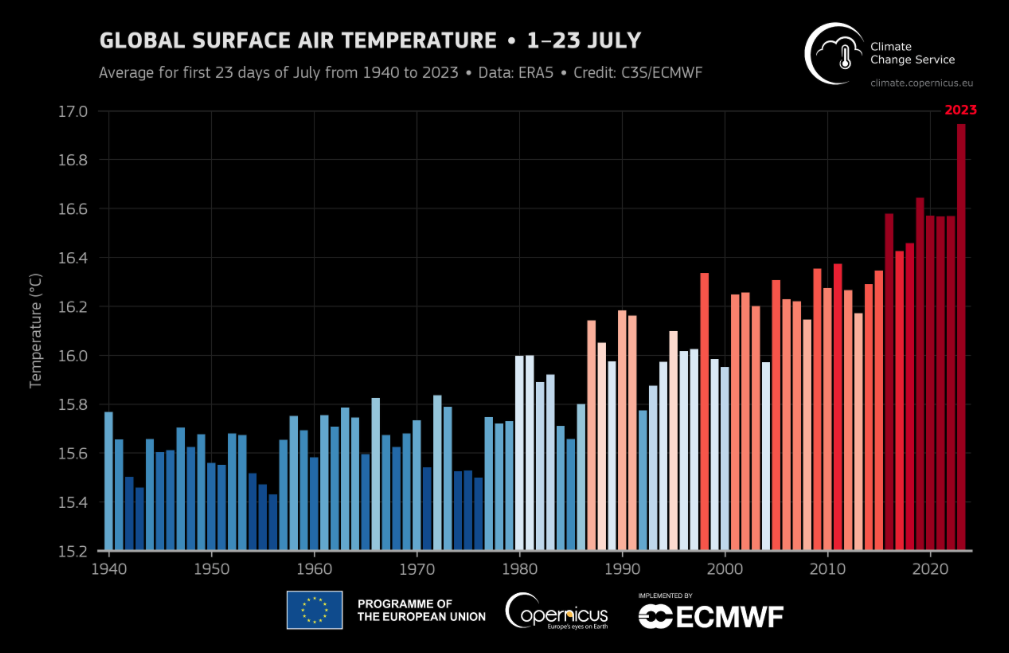
Globally averaged surface air temperature for 1-23 July for all months of July from 1940 to 2023. Shades of blue indicate cooler-than-average years, while red show years that were warmer than average. Data: ERA5. Credit: C3S/ECMWF.
It’s been a while…
The jumbled forces that move our world and interconnected systems are beginning to unravel our tangled lives. The summer of 2023 has brought heatwaves, wildfires, floods and landslides. After the hottest June on record, July turned out to be the hottest month in at least 120,000 years! Sea surface temperatures across the world were higher than in any previous May on record, with temperatures in the North Atlantic ocean being off the charts. The sea ice around Antarctica is 17% below the average for this time of year and the ‘winter’ in the southern hemisphere has witnessed heatwaves in Chile and Argentina.
Erratic weather has several implications, but immediately manifests in food. In India, it has meant a spike in vegetable and fruit prices, a ban on the export of non-Basmati rice and the area under sowing for rice and pulses is lower compared to last year. From El Nino to environmental justice, we are entangled in this all.
At the Rainmatter Foundation, untangling the knots is what we set out to do as we stepped into our second year in 2023. We have revisited the part we play in this space. We will continue to support meaningful efforts on the ground, but we are also laying emphasis on responding to communities’ needs that prioritise the well-being of the place along with its people. This is partly why we are engaging in fewer new conversations compared to last year even as we cobble together partners or deepen the work with networks. Some of this is reflected in The Climate Conversations, a long chat that our founding directors, Nithin and Kailash and CEO Sameer had with mediator Hansi Mehrotra. Going by the indications of the past few months, it seems like this is going to be a slower ride.
2023 has also been bittersweet for the team. We’ve welcomed new teammates (Abhishek, Tanmayi, Aishwarya, Mandeep, Siddharth, Abhinav, Mudassir and Akhileshwari), parted ways with some of our earliest companions (Divya and Rishabh Lalani) and are coming to terms with Shashank’s passing.
From the Community
Thanks to your participation, Grove is shaping into a vibrant platform. There are now more than a thousand people on Grove, talking about everything from textile waste and carbon robotics to green finance and EVs. While it is exciting to learn and discover opportunities there, we hope that Grove eventually becomes the go-to public forum for all-things climate and sustainability. If you aren’t on Grove yet, here’s a short guide to get you started, and follow the work of all the partner organisations here.
Veditum will host a public launch of its sand mining monitoring platform online on Zoom on Thursday, 10 August 2023. India Sand Watch is an open-data project enabling collection, annotation and archiving of data related to sand mining in India. The first-of-its-kind platform hopes to: act as a public facing archive of all sand mining related activity in India – news articles, survey reports, guidelines, tender documents, legal proceedings, and offer a platform and format to document instances of sand mining across India in the form of case files, link the case files to the different documents mentioned above and more. Register here to attend or email Siddharth: [email protected]
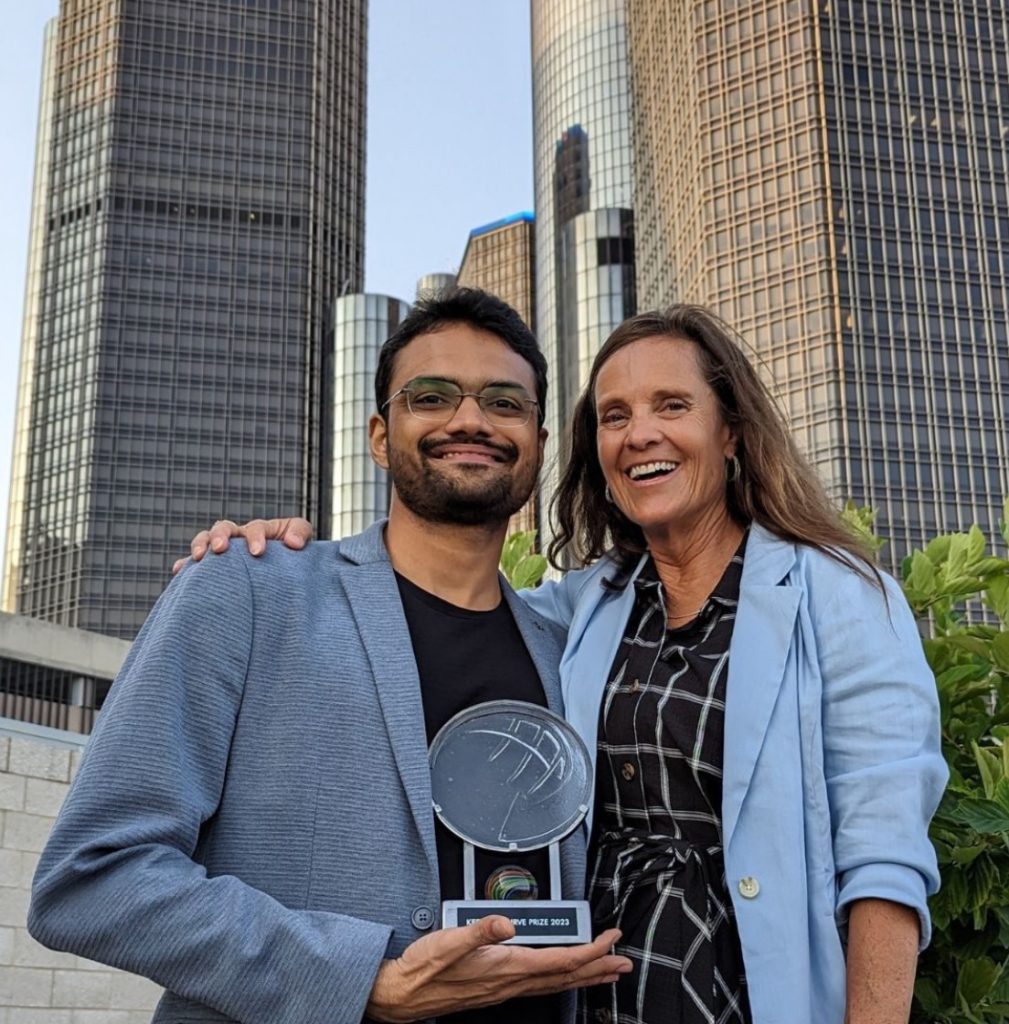
Waste Warrior’s Vishal Kumar with Jacquelyn Francis of the Global Warming Mitigation Project. Source: Waste Warriors
Waste Warriors has received the Keeling Curve Prize 2023 in the social and cultural pathways category for their participatory solution-building approach to waste management in the Himalayan Region. Kudos to the entire team for their efforts in the fragile ecosystem! PS: if you are keen to join the award-winning team, this is an opportune time – Waste warriors is hiring for a few positions.
Farmers for Forests is one of the 10 organisations globally to have been selected to be a part of the Henry Arnhold Fellowship by the Mulago Foundation. The Fellowship recognises leaders for promising conservation and climate solutions, and enables them to scale.
Civis launched Climate Voices, a go-to guide for anyone who wants to participate and make a difference in environmental law-making. The guide is available in five languages (English, Hindi, Marathi, Tamil and Kannada) and can be downloaded via WhatsApp as well. We hope individuals, organisations and media personnel will turn to Climate Voices for a deeper engagement around environmental regulation in light of the confidence-busting developments around the hasty passage of the Biological Diversity and Forest Conservation amendment bills. Do send us your feedback on the guide ([email protected] or [email protected]) and spread the word!
Vidhi Centre for Legal Policy along with several other stakeholders have been advocating for changes to the Forest Conservation (Amendment) Bill 2023. Their submission to the joint parliamentary committee is here, and views here. Related news report by The Morning Context here. The Vidhi team also put together an interesting report, The Green Hour, that analyses all the environment discussions that came up in the Parliament during the Budget Session 2023. The government responded to a total of 10,371 questions related to the environment during the session; most of the questions came from Parliamentarians in Maharashtra (76), Uttar Pradesh (68) and Andhra Pradesh (51). The Vidhi team categorised these questions into 10 themes, including climate change, pertaining to which 74 questions were discussed.
Water, Environment, Land and Livelihoods (WELL) Labs (formerly the Centre for Social and Environmental Innovation at ATREE) is now a research and innovation centre at the Institute for Financial Management and Research (IFMR). The team will focus its efforts on issues related to land degradation, rural livelihoods and water management. More here.
Buzz Women conducted a 4,333-household ‘basket of needs’ survey in 172 villages of Kolar district earlier this year. The survey was a set of questions to get participants to pay attention to their local natural assets such as trees, soil, water bodies, to understand their own consumption needs be it water or food/consumables etc and the relationship between the two. As an outcome of this survey, one woman, Nagamani, an anganwadi teacher from Srinivasapura Taluk, started a Naati Kozhi (desi poultry) farm last month. This is a tiny, but heartening and directionally significant step towards local production-consumption.
2023 has been designated as the International Year of Millets. The Locavore has been leveraging this opportunity for millet-based climate action by enabling urban restaurants and residents to include millets in their diet through recipes, workshops, stories and partnerships. A short video here and more details here.
Noticeboard
Climate-Parent Fellowship: Our Kids’ Climate is inviting applications to support their 2024 cohort for parent-led, intergenerational, and family-centred climate engagement work. Apply for the year-long program before 22nd September here.
Last month was globally observed as Plastic-Free July. Watch an octopus trade in a plastic cup for a shell home. The data design folks at Info Is Beautiful released this visualisation to show why plastic recycling does not work (based on data from 2017; nearly 1.7 billion more tonnes of plastic has been released by humanity since then):
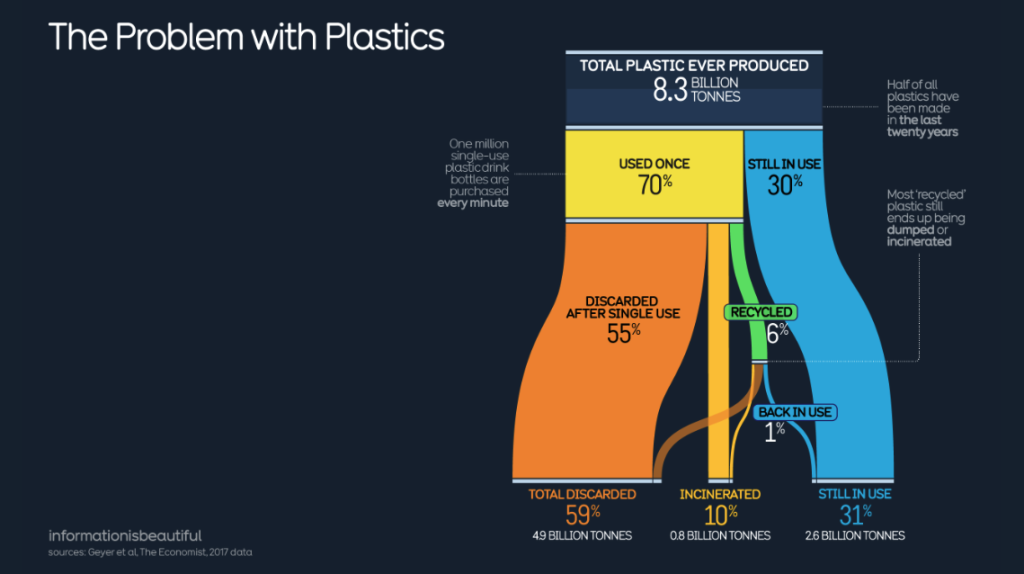
Source: Info is Beautiful
And don’t miss these wonderful resources on plastic and waste literacy for kids by the good folks at Pratham!
Transit fellowships: Karnataka’s Directorate of Urban Land Transport (DULT) is inviting candidates to apply for its Fellowships and Associateship Program for Hubballi-Dharwad. Last date to apply is 15th August. Details here.
Check out Earth Exponential, a platform launched by the India Climate Collaborative, to channelise catalytic funding for community-first climate solutions.
Need climate data? The folks at Climateworks Foundation have a helpful tool to allow users to navigate the many open climate data platforms.
The Case Against Engagement Rings by writer-editor Belinda Luscombe is by far the best romantic idea we’ve come across in recent times! Take this further this online sale season by going on a #FashionFast. Textile waste is an invisible MtEverest in the waste landscape. Here are suggestions for the questions we should be asking all clothing brands.
Indian Institute for Human Settlements is accepting paper submissions for its journal Urbanisation. Submission information here. Check out this world map of nature by cartographer Anton Thomas. Anton has been working on the pen- and pencil-map since 2020, and it features over 1,600 animals!
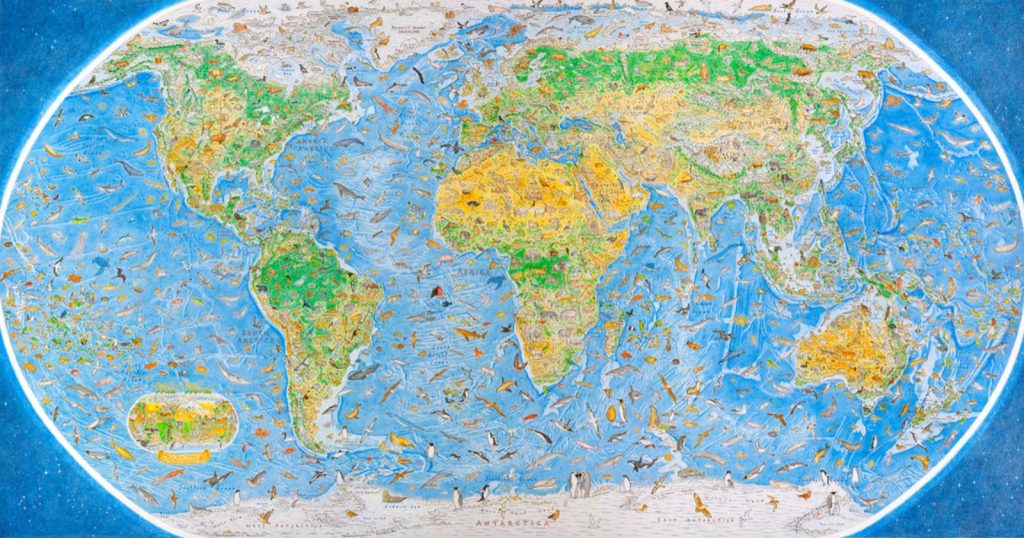
Source: https://www.antonthomasart.com
Did you know that growing rice can account for about 10% of global methane emissions? This article offers some techniques for curbing emissions.
The Slow Bake of Our Infrastructure: “…Most standards for climate risks are still based on historical data from past climate conditions that appear increasingly obsolete. As environmental extremes worsen, we must confront the reality that our infrastructures were designed for past conditions that no longer exist. With tremendous uncertainty about the future climate, how do we engineer our way out of the challenge?”
Parting shot
“Hope is not happiness or confidence or inner peace; it’s a commitment to search for possibilities,” writes Rebecca Solnit about why we cannot afford to be climate doomers.
Until next time, may your roads be auspicious
śubhāste panthānaḥ santu
Team Rainmatter Foundation

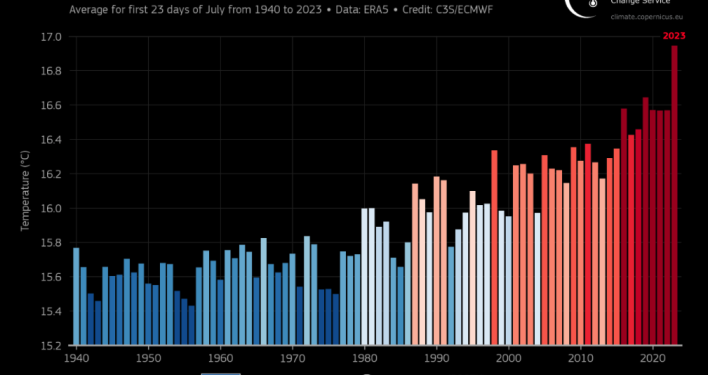
This was very insightful thanks for sharing these resources here